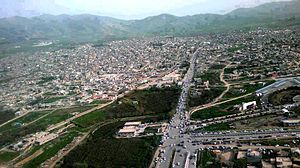Operation Viking Hammer
| Operation Viking Hammer | |||||||
|---|---|---|---|---|---|---|---|
| Part of Kurdistan Islamist Conflict and 2003 invasion of Iraq | |||||||
 Halabja city |
|||||||
|
|||||||
| Belligerents | |||||||
|
|
|
||||||
| Commanders and leaders | |||||||
|
|
|
||||||
| Strength | |||||||
| 600-800 fighters | 7,000 Kurds ~40 Americans |
||||||
| Casualties and losses | |||||||
|
Ansar al-Islam: 150-200 killed, remainder captured or fled to Iran Islamic Group of Kurdistan: 100 killed |
|
||||||
Operation Viking Hammer was an unconventional warfare operation during the Iraq War which took place in northern Iraq, commonly known as Iraqi Kurdistan. The goal of the operation was to eliminate the Ansar al-Islam terrorists as they had occupied parts of Kurdistan.
Ansar al-Islam was an Islamist terrorist organization which made its first appearance in Iraqi Kurdistan in December 2001. The group was made up of a combination of Kurdish recruits and Arab veterans of the war in Afghanistan. The group also had non-Kurdish/Arabic members. From 2001 to 2003, they fought against Kurdish forces in northern Iraq, carving out an enclave around the town of Halabja which they placed under their control. The CIA also suspected Ansar al-Islam of manufacturing chemical weapons and the poison Ricin in a factory in the town of Sargat.
In addition, at least two other militant Kurdish Islamic groups were operating in the region, and these generally aligned themselves with Ansar al-Islam.
After Turkey had denied the U.S. 4th Infantry Division passage through their borders, the burden of carrying out the northern front of the war in Iraq fell on an ad hoc coalition of Americans to include CIA Special Activities Division (SAD) paramilitary operations officers, Special Forces soldiers from 10th SFG and airborne units that parachuted into northern Iraq (however, the 173rd did not take part in Operation Viking Hammer), and Kurdish Peshmerga forces of the Patriotic Union of Kurdistan and Kurdish Democratic Party. Before beginning the attack south, the coalition forces first needed to destroy Ansar al-Islam's enclave in order to secure the Kurdish rear areas and free Kurdish forces to take part in the advance southwards.
...
Wikipedia
